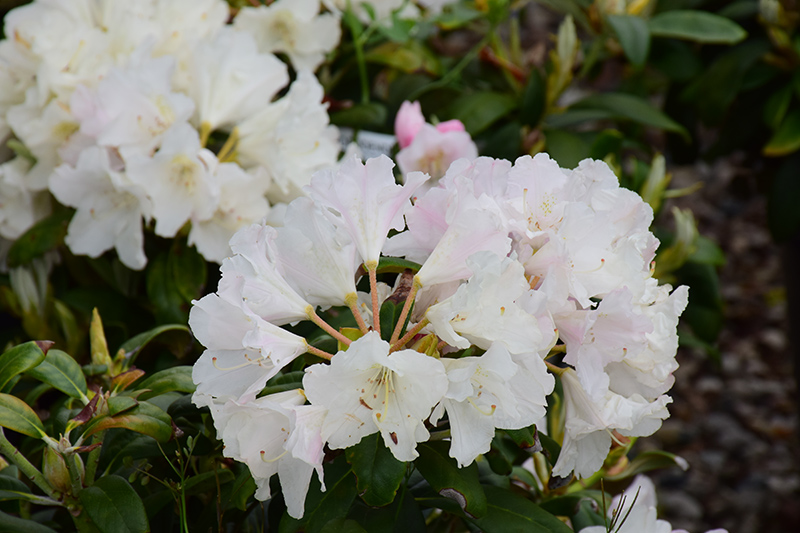Yaku Princess Rhododendron
Rhododendron yakushimanum 'Yaku Princess'
Height: 3 feet
Spread: 4 feet
Sunlight:
![]()
![]()
Hardiness Zone: 6a
Other Names: Yakushima Rhododendron
Description:
An outstanding broadleaf evergreen shrub for the garden border which features pink flower buds which open to soft white flowers in spring; well-drained, highly acidic and organic soil is essential, use plenty of peat moss when planting
Ornamental Features
Yaku Princess Rhododendron is smothered in stunning clusters of white trumpet-shaped flowers at the ends of the branches in mid spring. It has dark green evergreen foliage. The narrow leaves remain dark green throughout the winter.
Landscape Attributes
Yaku Princess Rhododendron is a dense multi-stemmed evergreen shrub with a more or less rounded form. Its average texture blends into the landscape, but can be balanced by one or two finer or coarser trees or shrubs for an effective composition.
This is a relatively low maintenance shrub, and should only be pruned after flowering to avoid removing any of the current season's flowers. It has no significant negative characteristics.
Yaku Princess Rhododendron is recommended for the following landscape applications;
- Mass Planting
- General Garden Use
- Container Planting
Planting & Growing
Yaku Princess Rhododendron will grow to be about 3 feet tall at maturity, with a spread of 4 feet. It has a low canopy. It grows at a slow rate, and under ideal conditions can be expected to live for 50 years or more.
This shrub does best in full sun to partial shade. You may want to keep it away from hot, dry locations that receive direct afternoon sun or which get reflected sunlight, such as against the south side of a white wall. It requires an evenly moist well-drained soil for optimal growth, but will die in standing water. It is very fussy about its soil conditions and must have rich, acidic soils to ensure success, and is subject to chlorosis (yellowing) of the foliage in alkaline soils. It is somewhat tolerant of urban pollution, and will benefit from being planted in a relatively sheltered location. Consider applying a thick mulch around the root zone in winter to protect it in exposed locations or colder microclimates. This is a selected variety of a species not originally from North America.
Yaku Princess Rhododendron makes a fine choice for the outdoor landscape, but it is also well-suited for use in outdoor pots and containers. Because of its height, it is often used as a 'thriller' in the 'spiller-thriller-filler' container combination; plant it near the center of the pot, surrounded by smaller plants and those that spill over the edges. It is even sizeable enough that it can be grown alone in a suitable container. Note that when grown in a container, it may not perform exactly as indicated on the tag - this is to be expected. Also note that when growing plants in outdoor containers and baskets, they may require more frequent waterings than they would in the yard or garden. Be aware that in our climate, this plant may be too tender to survive the winter if left outdoors in a container. Contact our experts for more information on how to protect it over the winter months.

